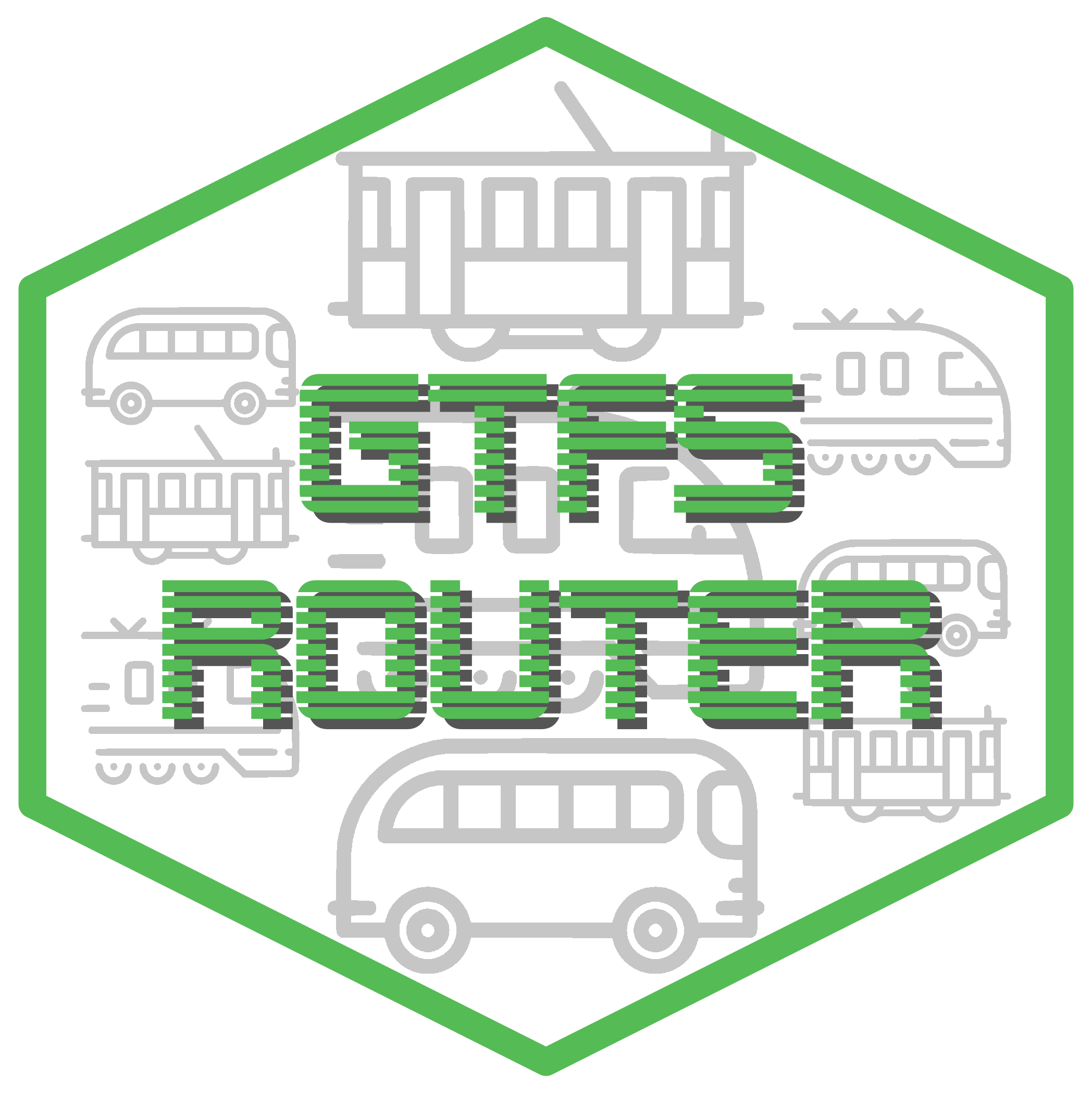
The hardware and bandwidth for this mirror is donated by METANET, the Webhosting and Full Service-Cloud Provider.
If you wish to report a bug, or if you are interested in having us mirror your free-software or open-source project, please feel free to contact us at mirror[@]metanet.ch.

R package for public transport routing with GTFS (General Transit Feed Specification) data.
You can install latest stable version of gtfsrouter from
CRAN with:
install.packages ("gtfsrouter")Alternatively, the current development version can be installed using any of the following options:
# install.packages("remotes")
remotes::install_git ("https://git.sr.ht/~mpadge/gtfsrouter")
remotes::install_git ("https://codeberg.org/UrbanAnalyst/gtfsrouter")
remotes::install_bitbucket ("urbananalyst/gtfsrouter")
remotes::install_gitlab ("UrbanAnalyst/gtfsrouter")
remotes::install_github ("UrbanAnalyst/gtfsrouter")To load the package and check the version:
library (gtfsrouter)
packageVersion ("gtfsrouter")## [1] '0.1.2.7'The main functions can be demonstrated with sample data included with
the package from Berlin (the “Verkehrverbund Berlin Brandenburg”, or
VBB). GTFS data are always stored as .zip files, and these
sample data can be written to the temporary directory
(tempdir()) of the current R session with the function
berlin_gtfs_to_zip().
filename <- berlin_gtfs_to_zip ()
print (filename)## [1] "/tmp/Rtmp420siD/vbb.zip"For normal package use, filename will specify the name
of a local GTFS .zip file.
Given the name of a GTFS .zip file,
filename, routing is as simple as the following code:
gtfs <- extract_gtfs (filename)
gtfs <- gtfs_timetable (gtfs, day = "Wed") # A pre-processing step to speed up queries
gtfs_route (gtfs,
from = "Tegel",
to = "Berlin Hauptbahnhof",
start_time = 12 * 3600 + 120
) # 12:02 in seconds| route_name | trip_name | stop_name | arrival_time | departure_time |
|---|---|---|---|---|
| U8 | U Paracelsus-Bad | U Schonleinstr. (Berlin) | 12:04:00 | 12:04:00 |
| U8 | U Paracelsus-Bad | U Kottbusser Tor (Berlin) | 12:06:00 | 12:06:00 |
| U8 | U Paracelsus-Bad | U Moritzplatz (Berlin) | 12:08:00 | 12:08:00 |
| U8 | U Paracelsus-Bad | U Heinrich-Heine-Str. (Berlin) | 12:09:30 | 12:09:30 |
| U8 | U Paracelsus-Bad | S+U Jannowitzbrucke (Berlin) | 12:10:30 | 12:10:30 |
| S5 | S Westkreuz | S+U Jannowitzbrucke (Berlin) | 12:15:24 | 12:15:54 |
| S5 | S Westkreuz | S+U Alexanderplatz Bhf (Berlin) | 12:17:24 | 12:18:12 |
| S5 | S Westkreuz | S Hackescher Markt (Berlin) | 12:19:24 | 12:19:54 |
| S5 | S Westkreuz | S+U Friedrichstr. Bhf (Berlin) | 12:21:24 | 12:22:12 |
| S5 | S Westkreuz | S+U Berlin Hauptbahnhof | 12:24:06 | 12:24:42 |
The gtfs_traveltimes()
function` calculates minimal travel times from any nominated stop to
all other stops within a feed. It requires the two parameters of start
station, and a vector of two values specifying earliest and latest
desired start times. The following code returns the fastest travel times
to all stations within the feed for services which leave the nominated
station (“Alexanderplatz”) between 12:00 and 13:00 on a Monday:
gtfs <- extract_gtfs (filename)
gtfs <- gtfs_timetable (gtfs, day = "Monday")
x <- gtfs_traveltimes (gtfs,
from = "Alexanderplatz",
start_time_limits = c (12, 13) * 3600
)The function returns a simple table detailing all stations reachable with services departing from the nominated station and start times:
head (x)| start_time | duration | ntransfers | stop_id | stop_name | stop_lon | stop_lat |
|---|---|---|---|---|---|---|
| 12:00:42 | 00:14:42 | 1 | 060003102223 | S Bellevue (Berlin) | 13.34710 | 52.51995 |
| 12:00:42 | 00:08:36 | 0 | 060003102224 | S Bellevue (Berlin) | 13.34710 | 52.51995 |
| 12:00:42 | 00:15:06 | 1 | 060003103233 | S Tiergarten (Berlin) | 13.33624 | 52.51396 |
| 12:00:42 | 00:10:42 | 0 | 060003103234 | S Tiergarten (Berlin) | 13.33624 | 52.51396 |
| 12:00:42 | 00:14:18 | 1 | 060003201213 | S+U Berlin Hauptbahnhof | 13.36892 | 52.52585 |
| 12:00:42 | 00:05:54 | 0 | 060003201214 | S+U Berlin Hauptbahnhof | 13.36892 | 52.52585 |
Further details are provided in a separate vignette.
Feeds should include a “transfers.txt” table detailing all possible
transfers between nearby stations, yet many feeds omit these tables,
rendering them unusable for routing because transfers between services
can not be calculated. The gtfsrouter package also includes
a function, gtfs_transfer_table(),
which can calculate a transfer table for a given feed, with transfer
times calculated either using straight-line distances (the default), or
using more realistic pedestrian times routed through the underlying
street network.
This function can also be used to enable routing through multiple
adjacent or overlapping GTFS feeds. The feeds need simply be merged
through binding the rows of all tables, and the resultant aggregate feed
submitted to the gtfs_transfer_table()
function. This transfer table will retain all transfers specified in the
original feeds, yet be augmented by all possible transfers between the
multiple systems up to a user-specified maximal distance. Further
details of this function are also provided in another separate
vignette.
There are many ways to construct GTFS feeds. For background
information, see gtfs.org,
and particularly their GTFS
Examples. Feeds may include a “frequencies.txt” table which defines
“service periods”, and overrides any schedule information during the
specified times. The gtfsrouter package includes a
function, frequencies_to_stop_times(),
to convert “frequencies.txt” tables to equivalent “stop_times.txt”
entries, to enable the feed to be used for routing.
All contributions to this project are gratefully acknowledged using
the allcontributors
package following the allcontributors specification.
Contributions of any kind are welcome!
|
mpadge |
stmarcin |
gmatosferreira |
dhersz |
polettif |
|
tbuckl |
tuesd4y |
Robinlovelace |
loanho23 |
abyrd |
hansmib |
These binaries (installable software) and packages are in development.
They may not be fully stable and should be used with caution. We make no claims about them.